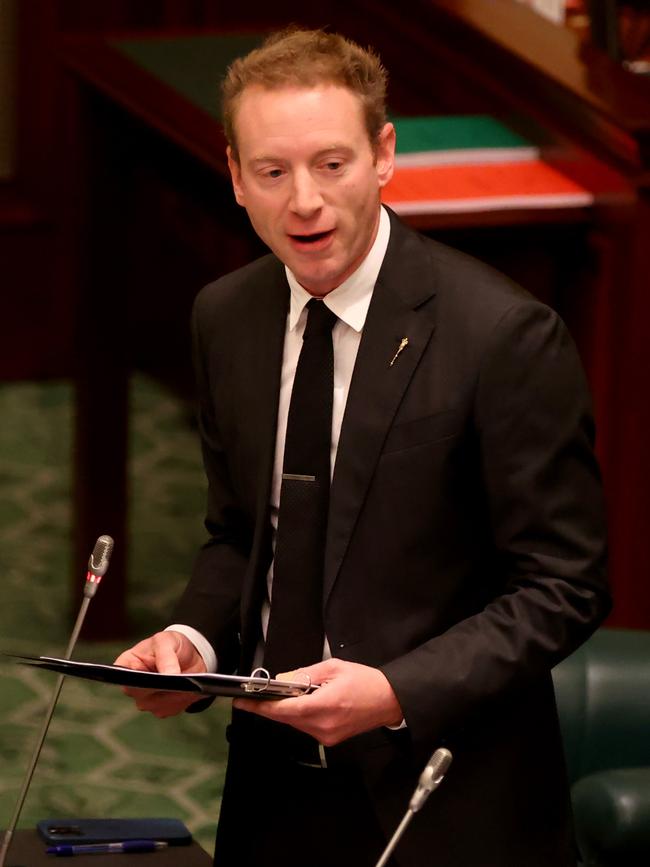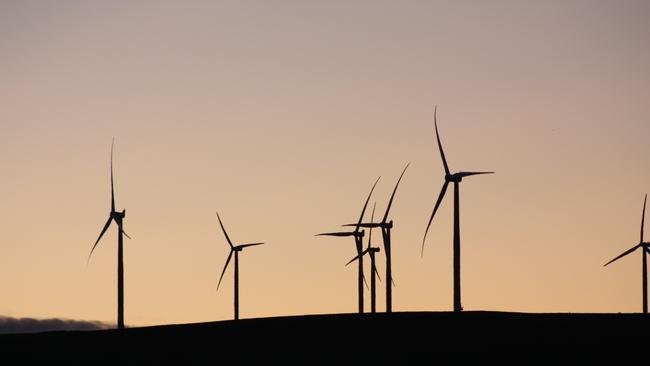‘Grotesque failure’: SA Premier lashes Liberal energy legacy
The Premier has slammed the Opposition’s legacy on energy policy, saying cash-strapped families were now paying the price.
SA News
Don't miss out on the headlines from SA News. Followed categories will be added to My News.
More than a decade of failed energy policy and a “grotesque failure” to decarbonise the nation have been blamed for soaring electricity prices by Premier Peter Malinauskas.
Commenting on an Advertiser story about renewable energy savings not being passed on to consumers, Mr Malinauskas told state parliament the consequences of energy policy failure were “playing out before our very eyes”.


“Of course, we would like to see renewables deliver greater cost reductions than what we’ve experienced thus far, but in no small part that is a function of the way the market is set up,” he said.
Mr Malinauskas vowed to introduce legislation next year to set up Labor’s promised $593m hydrogen power plant near Whyalla.
South Australia was “not currently experiencing a competitive advantage due to renewable energy”, a SA Productivity Commission report tabled in parliament on Tuesday found, because lower wholesale prices were not being passed on to consumers.
This was despite substantial investment in the first two decades of this century resulting in 62 per cent of the state’s energy being generated by renewable sources by 2020/21.
Asked by Opposition Leader David Speirs if Labor’s hydrogen power plant would lower electricity prices, Mr Malinauskas repeated an election comment that voters were “tired of seeing broken promises when it comes to commitments to reductions in power prices”.
Federal Labor has been attacked for vowing to cut power bills by $275 by the end of 2024 but the October 25 budget forecasting a 56 per cent rise within that time frame.
But Mr Malinauskas accused the state Liberals of breaking a 2018 election promise to cut power prices.
The Liberals, however, have argued they promised to cut annual average household power bills by $302 and, instead, delivered a $429 annual cut.
Responding to Mr Speirs, Mr Malinauskas said the hydrogen plant’s “principal objective” was to “create jobs in South Australia around the hydrogen industry” and a lesser one was to reduce power prices.
Power task force formed
It comes after South Australia’s much-vaunted advantage from renewable energy was been debunked by a top-level inquiry finding lower wholesale prices are not being passed on to consumers.
The state has “some significant natural advantages” in renewable power, an SA Productivity Commission inquiry found, but these are being undermined by the electricity market.
The commission’s annual report, tabled in state parliament on Tuesday afternoon, found SA has “some of the best combined wind and solar resources in the world”.
Substantial investment in renewable energy during the first two decades of this century resulted in 62 per cent of the state’s energy being generated by renewable sources by 2020/21.
This meant average prices in the wholesale electricity market went from being among Australia’s highest to among the lowest.
“However, the state’s ability to take advantage of these natural advantages has been limited by problems in the local electricity market, which reduced the pass through of these lower prices to consumers, and from several adverse policy changes,” the commission’s annual report says.

“This means that South Australia is not currently experiencing a competitive advantage due to renewable energy.”
The Productivity Commission was asked in November 2021, under the previous Liberal government, to inquire into SA’s potential to “secure a competitive advantage from renewable energy, what could be done to enhance any such advantage, and what economic opportunities it might enable”.
A draft report was published on May 10 and Mr Malinauskas was provided with the Productivity Commission final report on the issue on August 10, the annual report says. This will be published, along with a government response, in the present financial year, the annual report says.
A new committee, chaired by Mr Malinauskas, will examine measures to shield SA from the worst impacts of the national energy crisis.
The National Energy Crisis Committee of Cabinet will be supported by a separate task force, which will help develop a response to forecast electricity price increases.
The task force will be co-chaired by Energy and Mining Minister Tom Koutsantonis and the chief executive of the Energy and Mining Department.
Announcing the committee and task force in parliament on Tuesday, Mr Malinauskas said they were formed to address soaring electricity and gas prices.
“Power increases of this scale are completely unacceptable to the community and will have significant adverse impacts on households and businesses, worsening pressure on the cost-of-living crisis, reducing real disposable income and impacting economic growth,” he said. The federal budget forecast electricity price increases of 56 per cent in the next two years.

Additionally, federal treasury revealed it expects retail gas prices to increase by 20 per cent this year and another 20 per cent in 2023-24.
Mr Malinauskas said power price rises in South Australia were expected to be lower than in the eastern states, but still severe. “As noted by the Commonwealth, the Australian Energy Market Operator and the Australian Energy Regulator, the illegal invasion of Ukraine by Russia has caused a global gas supply crisis, which has increased to extraordinary levels,” Mr Malinauskas said.
“Australia, including South Australia, is not immune to these price rises.”
He said the state was working collaboratively with the Commonwealth, other states and territories, and national market bodies.
“The Commonwealth has considerable regulatory powers and South Australia will welcome those powers being exercised in the pursuit of affordable, reliable and cleaner energy,” Mr Malinauskas said.




